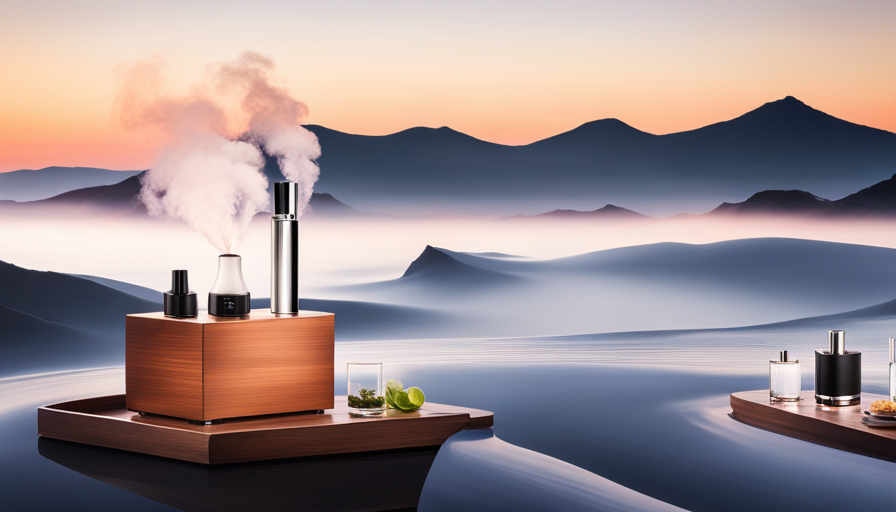Essential Oil Nebulizer Vs Diffuser

Are you overwhelmed by the variety of options when it comes to diffusing essential oils? Fear not, for we are here to shed light on the debate between essential oil nebulizers and diffusers.
Picture this: a room enveloped in a tranquil mist, calming scents filling the air, and your worries drifting away. But which device should you choose to achieve this aromatic oasis?
In this article, we will explore the differences between nebulizers and diffusers, their unique benefits, and help you make an informed decision based on your needs and preferences.
Key Takeaways
- Essential oil devices, such as nebulizers and diffusers, can provide relief for respiratory issues and alleviate symptoms like congestion, coughing, and allergies.
- Different essential oils, such as eucalyptus, peppermint, tea tree, and lavender, offer specific benefits for respiratory health.
- When choosing between a nebulizer and diffuser, it is important to consider personal preferences and needs, as well as the advantages and drawbacks of each option.
- Advantages of using an essential oil nebulizer include dispersing pure essential oils without dilution, providing full therapeutic benefits, targeting specific respiratory issues, and offering a stronger scent. On the other hand, advantages of using an essential oil diffuser include mixing essential oils with water or carrier oils, releasing oils as a fine mist, offering a softer scent, and being a more cost-effective option.
Understanding the Basics of Essential Oil Diffusers and Nebulizers
If you’re looking to understand the basics of essential oil diffusers and nebulizers, it’s important to know how they work and what sets them apart.
Essential oil diffusers come in various types, including ultrasonic, heat-based, evaporative, and nebulizing. Ultrasonic diffusers use water to disperse the oils into the air as a fine mist, while heat-based diffusers rely on heat to vaporize the oils. Evaporative diffusers use a fan or natural airflow to evaporate the oils.
Nebulizers, on the other hand, are considered more advanced because they don’t require water or heat. They use an atomizer to break down the oils into tiny particles that can be easily inhaled.
Understanding these diffuser types and comparing their features is crucial for choosing the right one for your needs.
Now let’s explore the differences between essential oil diffusers and nebulizers.
The Differences Between Essential Oil Diffusers and Nebulizers
When choosing between a diffuser and a nebulizer, you’ll want to understand the key distinctions. One major difference lies in their effectiveness. Diffusers use water to disperse essential oils into the air as a fine mist, allowing for better absorption by the body. Nebulizers, on the other hand, break down essential oils into tiny particles without dilution, making them more potent but less gentle on the respiratory system.
Another factor to consider is price. Diffusers are generally more affordable and come in a variety of styles and sizes to suit different needs and budgets. Nebulizers tend to be pricier due to their advanced technology.
Now that you have an understanding of the differences between these two options, let’s explore the benefits of using an essential oil diffuser.
Benefits of Using an Essential Oil Diffuser
Using an essential oil diffuser can provide you with numerous benefits.
Firstly, it allows you to enjoy the aromatherapy benefits of essential oils, which can help promote relaxation and reduce stress.
Additionally, diffusers also act as humidifiers, adding moisture to the air and combatting dryness in your home or office space.
Lastly, these devices are incredibly easy to use and can be customized to suit your preferences by adjusting the intensity of the scent or using different essential oil blends for various purposes.
Aromatherapy Benefits
To experience the benefits of aromatherapy, you can easily use either an essential oil nebulizer or a diffuser. Aromatherapy techniques involve using essential oils to promote relaxation, reduce stress, and improve overall well-being. Both nebulizers and diffusers are effective essential oil diffusion methods that allow you to enjoy these benefits in your home or office.
An essential oil nebulizer works by breaking down the oils into tiny particles that are dispersed into the air. This method provides a more concentrated aroma and is ideal for larger spaces.
On the other hand, an essential oil diffuser uses water and ultrasonic vibrations to release a fine mist of essential oils into the air. This method is great for smaller areas and also adds moisture to the air.
By incorporating aromatherapy into your daily routine, you can create a calming environment that promotes relaxation and reduces stress.
In the subsequent section about humidifying and purifying the air, we will explore how these devices can also improve your indoor air quality without any additional steps needed.
Humidifying and Purifying the Air
Humidifying and purifying the air can greatly improve indoor air quality. Using an essential oil nebulizer or diffuser not only adds a pleasant aroma to your space, but it also provides several benefits for your health and well-being.
When it comes to humidifying, these devices add moisture to the air, which can help alleviate dryness in the skin, throat, and nasal passages. This is especially beneficial during dry winter months or in arid climates.
Additionally, both nebulizers and diffusers have air purification properties. They release tiny particles of essential oils into the air that have antimicrobial properties, helping to kill airborne germs and bacteria. This can reduce the risk of respiratory infections and allergies caused by pollutants in the air.
Moving on to ease of use and customization…
Ease of Use and Customization
One of the benefits of these devices is how easy they are to use and customize.
With both essential oil nebulizers and diffusers, you have a range of options to personalize your experience. You can choose from different timer settings, allowing you to control how long the device runs. Some models even offer adjustable mist output levels, so you can tailor the strength of the aroma to your preference.
Additionally, many nebulizers and diffusers come with built-in LED lights that can be customized to create a calming ambiance in any room.
When it comes to ease of maintenance, both devices are relatively simple to clean and refill with water and essential oils. This makes them convenient for regular use without requiring much effort or time on your part.
Moving forward into the next section about benefits of using an essential oil nebulizer, you’ll discover even more reasons why this device is worth considering for your aromatherapy needs.
Benefits of Using an Essential Oil Nebulizer
If you’re looking for a pure and concentrated aromatherapy experience, an essential oil nebulizer is the way to go.
Unlike diffusers, nebulizers don’t require water or heat to release the oils into the air, ensuring that you’re getting the full therapeutic benefits of the oils without any dilution.
Additionally, nebulizers are particularly beneficial for those with respiratory issues, as they can help alleviate symptoms and promote easier breathing.
Pure and Concentrated Aromatherapy Experience
For a truly immersive aromatherapy experience, nothing beats the pure and concentrated scent of essential oils diffused through a nebulizer. Unlike other methods of diffusion, nebulizers release undiluted essential oil particles into the air, allowing you to fully experience the fragrance without any dilution or alteration. This ensures that you are receiving the maximum health benefits of aromatherapy, as the potent aroma can stimulate your senses and promote relaxation, stress relief, and improved mood.
Using an essential oil nebulizer offers several advantages:
- It allows for a more intense and powerful aroma due to its direct diffusion method.
- The concentrated essential oil particles are easily absorbed by your body when inhaled.
- You can enjoy a longer-lasting scent as there is no water involved to dilute or evaporate the oils.
With a nebulizer, you can indulge in the true essence of essential oils without any compromise. Plus, it eliminates the need for water or heat in order to disperse the oils effectively.
No Water or Heat Required
Using a nebulizer means you don’t need to rely on water or heat for effective diffusion of fragrances. Unlike diffusers that require electricity and water, nebulizers work by converting essential oils into a fine mist without diluting them. This method ensures that the full therapeutic properties of the oils are preserved, providing a more potent and concentrated aromatherapy experience.
Additionally, nebulizers are portable and travel-friendly since they don’t need to be plugged in or require any bulky equipment. You can easily carry them with you wherever you go, allowing you to enjoy the benefits of essential oils on-the-go. Not only does this make nebulizers convenient for daily use at home, but it also makes them ideal for those who want to bring their aromatherapy practice with them while traveling.
Transitioning into the next section about ‘therapeutic benefits for respiratory issues’, nebulizers offer even more advantages beyond just their portability and lack of reliance on water or heat.
Therapeutic Benefits for Respiratory Issues
If you’re looking for a way to improve your respiratory health and enjoy the therapeutic benefits of essential oils, both nebulizers and diffusers can be great options.
However, one advantage that stands out with these devices is their ability to provide relief for various respiratory issues. By dispersing essential oils into the air, they can help alleviate symptoms such as congestion, coughing, and allergies. The inhalation of these oils can also support overall respiratory function and promote a sense of well-being.
It’s important to note that different essential oils offer specific benefits for respiratory health, with eucalyptus, peppermint, tea tree, and lavender being popular choices.
Whether you choose a nebulizer or diffuser ultimately depends on your personal preferences and needs.
So let’s explore how to make the right choice for you in the next section without delay!
Choosing the Right Option for Your Needs and Preferences
When deciding between an essential oil nebulizer and diffuser, it’s important to choose the option that best suits your needs and preferences. Both options have their own advantages and drawbacks, so it’s crucial to compare different types of essential oil diffusers before making a decision.
If you prefer a stronger scent or want to target specific respiratory issues, an essential oil nebulizer might be the better choice. Nebulizers disperse pure essential oils into the air without dilution, allowing you to experience the full therapeutic benefits. However, they can be louder and use more oils compared to diffusers.
On the other hand, if you prefer a softer scent or want a more cost-effective option, an essential oil diffuser could be ideal. Diffusers mix essential oils with water or carrier oils before releasing them into the air as fine mist. They are generally quieter and require less oil for longer-lasting diffusion.
Ultimately, your decision should be based on what you prioritize in terms of scent strength, ease of use, noise level, and cost-effectiveness. Considering these factors will help ensure that you choose the right option for your needs and preferences when it comes to using essential oils for therapeutic purposes.
Conclusion
In conclusion, when it comes to choosing between an essential oil diffuser and a nebulizer, it’s important to consider your needs and preferences.
If you prefer a gentle and continuous diffusion of aroma throughout the room, the diffuser is your best bet. It provides a subtle and long-lasting scent that can create a relaxing atmosphere.
On the other hand, if you’re looking for a more powerful and concentrated release of essential oils, the nebulizer is the way to go. It breaks down the oils into tiny particles, allowing for a more intense and immediate effect.
Both options have their unique benefits that can enhance your well-being. The diffuser offers a soothing and calming experience, while the nebulizer provides a more potent and invigorating effect.
Ultimately, the choice between the two depends on your personal preferences and the desired outcome. So take your time, consider your needs, and let the soothing scents transport you to a state of tranquility.






